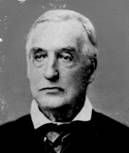The ripple effects of December’s Battle of Fredericksburg continue as today William F. Broaddus begins a new chapter in his ministerial career.
Broaddus, well-known Virginia Baptist educator and preacher from Fredericksburg, has had his share of difficulties in recent times. After having spent almost two months in a Union prison in Washington, D.C. from July 29 until September 26, his house was then irreparably damaged during the Battle of Fredericksburg. Knowing of his plight, the Charlottesville Baptist Church had contacted him about filling their pulpit, and today, the first in his new position, he once again tackles life and ministry with zest.
A biographical sketch of Broaddus summarizes his wartime activities from henceforth, as well as his return to Fredericksburg in his final days.
Besides his preaching and visiting as pastor he was zealous in doing all that he could for the soldiers in the hospitals in the town. Not only on Sunday, but on week days, he preached and visited in the various wards. These were days when rumors of battles were new nearly every day, and when the anxiety of those who stayed with the staff was almost as terrible as the suffering of the soldiers on the tented field. Dr. Broaddus boarded for a while at the Albemarle Female Institute, then in charge of Prof. John Hart ; later he had his own home, and himself had a number of boarders. During the Charlottesville pastorate, and just after the War, a conference was held between a number of leading men in the Baptist and Disciple denominations to see if there was any possibility of the two bodies uniting. Dr. Broaddus was one of the moving spirits in this gathering, but unfortunately no practical results were reached.
The work with which Dr. Broaddus’ active service closed was in an agency to raise money for the education of the orphans of Confederate soldiers. His love for children, and his lifelong interest in education, made this work doubly congenial to him, while his tact and skill in raising money peculiarly qualified him for it. No attempt was made to establish schools, but simply to provide tuition, for as many orphans as possible, in schools already in existence. This of course was before the day of public schools. At first Dr. Broaddus carried on this work in connection with his pastorate, but finally he resigned his church, and gave his whole time to the cause of the orphans. He traveled constantly, visiting churches, district associations, and other gatherings, pleading for gifts, also, as he went along, from individuals. He was to a high degree successful in this undertaking. In 1865, he was called to the pastorate of his old charge in Fredericksburg. While he declined this call, a little later he made Fredericksburg once more his home, still carrying on his agency work. His last days were marked by heavy and sad affliction. Blindness came upon him, which even the best medical skill did not relieve, and before the end his mind became unsettled. From these great distresses he was delivered on September 8, 1876, when he passed to his heavenly reward. His ashes rest beneath the sod of the Fredericksburg cemetery.
Source: George Braxton Taylor, editor, Virginia Baptist ministers: 3d series, Lynchburg, Va.: J. P. Bell, 1912, pp. 246-247 (link)



